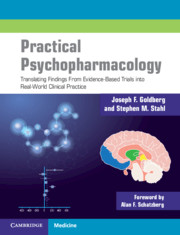 Practical Psychopharmacology
Practical Psychopharmacology Book contents
- Practical Psychopharmacology
- Practical Psychopharmacology
- Copyright page
- Dedication
- Contents
- Foreword
- Preface
- Abbreviations
- Part I General Principles
- 1 Core Concepts of Good Psychopharmacology
- 2 Targets of Treatment: Categories versus Dimensions of Psychopathology
- 3 Interpreting and Using the Literature: Integrating Evidence-Based Trials with Real-World Practice
- 4 Placebo and Nocebo Effects
- 5 Tailoring the Fit: Moderators and Mediators of Treatment Outcome
- 6 Complex Regimens and Rationale-Based Combination Drug Therapies
- 7 Laboratory Values and Psychiatric Symptoms: What to Measure, What Not to Measure, and What to Do With The Results
- 8 Pharmacogenetics: When Relevant, When Not
- 9 Cross-tapering and the Logistics of Drug Discontinuation
- 10 Managing Major Adverse Drug Effects: When to Avoid, Switch, or Treat Through
- 11 Novel Drug Therapeutics: Nutraceuticals, Steroids, Probiotics, and Other Dietary Supplements
- 12 Human Diversity and Considerations in Special Populations
- Part II Targets of Pharmacotherapy
- References
- Index
8 - Pharmacogenetics: When Relevant, When Not
from Part I - General Principles
Published online by Cambridge University Press: 19 October 2021
- Practical Psychopharmacology
- Practical Psychopharmacology
- Copyright page
- Dedication
- Contents
- Foreword
- Preface
- Abbreviations
- Part I General Principles
- 1 Core Concepts of Good Psychopharmacology
- 2 Targets of Treatment: Categories versus Dimensions of Psychopathology
- 3 Interpreting and Using the Literature: Integrating Evidence-Based Trials with Real-World Practice
- 4 Placebo and Nocebo Effects
- 5 Tailoring the Fit: Moderators and Mediators of Treatment Outcome
- 6 Complex Regimens and Rationale-Based Combination Drug Therapies
- 7 Laboratory Values and Psychiatric Symptoms: What to Measure, What Not to Measure, and What to Do With The Results
- 8 Pharmacogenetics: When Relevant, When Not
- 9 Cross-tapering and the Logistics of Drug Discontinuation
- 10 Managing Major Adverse Drug Effects: When to Avoid, Switch, or Treat Through
- 11 Novel Drug Therapeutics: Nutraceuticals, Steroids, Probiotics, and Other Dietary Supplements
- 12 Human Diversity and Considerations in Special Populations
- Part II Targets of Pharmacotherapy
- References
- Index
Summary
In Chapter 5, we discussed the growing concept of precision medicine and its forerunner term, “personalized medicine,” as the initiative to craft individually tailored treatments. For psychiatry, precision medicine represents the goal of utilizing a given patient’s unique clinical and biological profile in order to broker the best fit with a particular drug regimen. That theme is woven throughout this book, as the means by which clinicians must interpret large-scale clinical trials and decide whether and how their findings apply to an individual case. In the minds of many psychopharmacologists, pharmacogenetics and pharmacogenomics represent a key component, if not the key component, of that endeavor, based on assumptions that everyone’s unique genetic architecture must figure critically in how they will respond to a drug – and that without such information, efforts toward devising an appropriate pharmacotherapy regimen are merely trial and error.
- Type
- Chapter
- Information
- Practical PsychopharmacologyTranslating Findings From Evidence-Based Trials into Real-World Clinical Practice, pp. 149 - 168Publisher: Cambridge University PressPrint publication year: 2021
